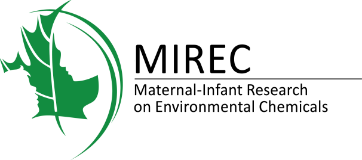
Combined Exposure to Folate and Lead during Pregnancy and Autistic-Like Behaviors among Canadian Children from the MIREC Pregnancy and Birth Cohort.
Alampi JD, Lanphear BP, MacFarlane AJ, Oulhote Y, Braun JM, Muckle G, Arbuckle TE, Ashley-Martin J, Hu J, Chen A, McCandless LC. Environmental Health Perspectives 2024 Oct;132(10):107003. doi: 10.1289/EHP14479
Question: What is the relationship between prenatal blood lead concentrations and autistic-like behaviors in young children? And is this association modified by prenatal folate concentrations, maternal folic acid supplementation or genetics?
What did the researchers do:
During pregnancy, blood samples from MIREC women were analysed for lead and total folate concentrations. Questionnaires collected information on intake of dietary supplements containing folic acid during pregnancy. As part of the MIREC-CD Plus study, childhood autistic-like behaviors were tested in 601 children 3-4 y of age, using the Social Responsiveness Scale-2 (SRS-2). Higher scores on this screening tool denote more autistic-like behaviors. Researchers from Simon Fraser University examined the association between maternal lead concentrations and SRS-2 scores, also considering folate exposure.
What did they find:
Each two-fold increase in first-trimester blood lead was associated with a 0.4-point increase in child SRS-2 scores (95% CI: −0.3, 1.1), indicating slightly more autistic-like behaviors. Third-trimester blood lead concentrations were associated with higher SRS-2 scores [βadj=3.3; 95% confidence interval (CI): 1.1, 5.5] among participants with low (<10th percentile) third-trimester plasma total folate concentrations. A similar relationship was also observed with maternal intake of folic acid supplements. Both folate indicators modified first-trimester blood lead and SRS-2 associations, but to a lesser extent.
What does this mean:
This study is the first, to our knowledge, to find evidence that the associations between prenatal lead concentrations and childhood autistic-like behaviors are stronger when gestational plasma total folate concentrations or folic acid supplementation are lower. The benefits of prenatal folic acid supplementation for reducing the risk of a neural tube defect are well documented, and these results suggest that folic acid supplementation during pregnancy may have additional benefits in lessening the toxic effects of lead exposure.
MIREC Année all rights reserved - Privacy policy
Website by Riposte


